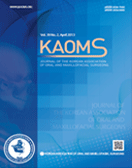Journal of the Korean Association of Oral and Maxillofacial Surgeons
- P-ISSN2234-7550
- E-ISSN2234-5930
- SCOPUS, KCI, ESCI
 ISSN : 2234-7550
ISSN : 2234-7550
Acute cardiovascular complications in patients with diabetes and hypertension: management consideration for minor oral surgery
Pooja Raosaheb Tarte (Department of Dentistry, Jamia Islamia Ishaatul Uloom (JIIU)’s Indian Institute of Medical Science & Research Medical College, Jalna, India)
Abstract
Objectives: Medically compromised patients often fear required dental surgical procedures that can increase the risk of medical emergency when combined with reduced tolerance for stress. A stress reduction protocol (SRP) helps doctors minimize treatment-related stress and improves patient management with minimum complications. Diabetes and co-morbid hypertension carry 4-fold risk of aggravation of cardiovascular emergencies and 7.2-fold risk of mortality. Diabetic neuropathy can result in difficult diagnosis of myocardial infarction and reduces chances of surviving a myocardial infarction compared with a non-diabetic person. The aim of the study was to assess the feasibility of a protocol for management of patients having both diabetes and hypertension who required minor oral surgery to minimize the rate of cardiovascular emergencies. Materials and Methods: A prospective study was conducted in 140 patients having both diabetes and hypertension who required minor oral surgical procedures. A systematic approachable protocol was designed for management of such patients. Results: Among 140 patients, 6 patients (4.3%) had cardiovascular complications, while 3 patients (1 with syncope and 2 with hypertension) did not require any intervention other than observation. Two patients were managed with aspirin and nitroglycerin, and 1 patient had possible myocardial infarction (overall incidence 0.7%) with chest pain, S-T segment elevation on electrocardiogram, and troponin level of 0.60 ng/mL. Conclusion: The proposed protocol helps to improve management of patients having both diabetes and hypertension. We recommend that patients with uncontrolled diabetes and uncontrolled hypertension and/or patients having history of cardiovascular complication should be treated in a medical facility with a readily available cardiology unit. This facilitates prompt response to emergency and instant implementation of treatment, helping to reduce morbidity and mortality.
- keywords
- Diabetes, Hypertension, Cardiovascular complications, Oral surgery
- 다운로드 수
- 조회수
- 0KCI 피인용수
- 0WOS 피인용수